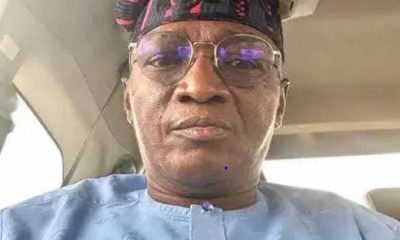Economy
CBN introduces N500bn, N200bn minimum capital base for banks

Days after urging Nigerian banks to expedite action on the recapitalisation of their capital base in order to strengthen the financial system, the Central Bank of Nigeria (CBN) on Thursday, March 28, 2024, unveiled new minimum capital requirements for banks, pegging the minimum capital base for commercial banks with international authorisation at N500 Billion.
Confirming this in Abuja, on Thursday, March 28, 2024, the Acting Director, Corporate Communications Department, Mrs. Hakama Sidi Ali said the new minimum capital base for commercial banks with national authorisation is now N200 Billion, while the new requirement for those with regional authorization is N50 Billion.
Mrs. Sidi Ali also disclosed that the new minimum capital for merchant banks would be N50 Billion, while the new requirements for non-interest banks with national and regional authorisations are N20 Billion and N10 Billion, respectively.
A circular signed by the Director, Financial Policy and Regulation Department, Mr. Haruna Mustafa, to all commercial, merchant, and non-interest banks and promoters of proposed banks emphasized that all banks are required to meet the minimum capital requirement within 24 months commencing from April 1, 2024, and terminating on March 31, 2026.
According to the circular, the move, initially disclosed by the CBN Governor, Olayemi Cardoso, in his address to the Annual Bankers’ Dinner in November 2023, was to enhance banks’ resilience, solvency, and capacity to continue supporting the growth of the Nigerian economy.
To enable them to meet the minimum capital requirements, the CBN urged banks to consider inject fresh equity capital through private placements, rights issues and/or offers for subscription; Mergers and Acquisitions (M&As); and/or upgrade or downgrade of license authorisation.
Furthermore, the circular disclosed that the minimum capital shall comprise paid-up capital and share premium only. It stressed that the new capital requirement shall not be based on the Shareholders’ Fund.
“Additional Tier 1 (AT1) Capital shall not be eligible for meeting the new requirement. Notwithstanding the capital increase, banks are to ensure strict compliance with the minimum capital adequacy ratio (CAR) requirement applicable to their license authorisation.
“In line with extant regulations, banks that breach the CAR requirement shall be required to inject fresh capital to regularise their position,” it added.
The CBN circular said the minimum capital requirement for proposed banks shall be paid-up capital, adding that the new minimum capital requirement shall apply to all new applications for banking licenses submitted after April 1, 2024.
It noted that the CBN would continue to process all pending applications for banking licenses for which a capital deposit had been made and/or an Approval-in-Principle (AIP) had been granted. However, it said that the promoters of such proposed banks would make up the difference between the capital deposited with the CBN and the new capital requirement no later than March 31, 2026.
Meanwhile, the CBN said all banks are required to submit an implementation plan (clearly indicating the chosen option(s) for meeting the new capital requirement and various activities involved with their timelines) no later than April 30, 2024. The CBN also disclosed that it would l monitor and ensure compliance with the new requirements within the specified timeline.
Economy
Trump gives TikTok extra 75 days to find US buyer

President Donald Trump has given TikTok a 75-day extension, staving off a ban on the Chinese-owned app just as its April 5 deadline loomed.
In a Friday post on Truth Social—his social media platform- the US President trumpeted an executive order to extend negotiations, a move he cast as a lifeline for a deal he’s keen to seal.
“My Administration has been working very hard on a Deal to SAVE TIKTOK, and we have made tremendous progress,” Trump wrote.
“The deal requires more work to ensure all necessary approvals are signed, which is why I am signing an Executive Order to keep TikTok up and running for
an additional 75 days.”
The ban, initially deferred on his first day back in office in January, had been barrelling toward an April 5 cutoff—now pushed out once more.
TikTok’s parent company, ByteDance, has been under pressure to divest its US business following bipartisan legislation passed in 2024 that mandates the app’s separation from Chinese ownership.
Trump laced his announcement with a jab at China, irked, he said, by his reciprocal tariffs. “We hope to continue working in good faith with China,” he added, calling tariffs “the most powerful economic tool” and vital for national security.
“We do not want TikTok to ‘go dark,’” he insisted, eyeing a resolution that keeps the app alive.
We look forward to working with TikTok and China to close the deal. Thank you for your attention to this matter!”
Economy
Naira Depreciates Significantly In Official Market

The Naira depreciated to N1,600 per dollar in the Nigerian Foreign Exchange Market (NFEM) today after three months of being on the N1,500 per dollar threshold.
Data published by the Central Bank of Nigeria, CBN, showed that the indicative exchange rate for the naira rose to N1,600 per dollar from N1,569 per dollar on Thursday, indicating N31 depreciation for the naira.
Likewise, the naira depreciated to N1,565 per dollar in the parallel market from N1,555 per dollar on Thursday.
Consequently, the margin between the parallel market and NFEM rate widened to N35 per dollar from N14 per dollar on Thursday.
Economy
Local refineries importing substandard crude, PETROAN alleges

The Petroleum Products Retail Outlet Owners Association of Nigeria says some local refineries are importing substandard crude into Nigeria to cut costs.
Speaking with our correspondent on Thursday, PETROAN National Publicity Secretary Joseph Obele said the refineries have been importing crude oil with high sulphur content into Nigeria.
Asked to mention some of the refineries, Obele declined, saying the concerned refineries know themselves, hoping they will adjust.
According to him, the importation of low-quality crude oil into Nigeria started following the suspension of the naira-for-crude deal by the Federal Government.
He said, “Some refineries are importing substandard crude into the country. They do this to cut costs following the stoppage of the naira-for-crude deal. We are not going to mention any particular refinery, but when those concerned see the report, they will make corrections.
“Many may not know there is substandard crude. Any crude oil with high sulphur content does not meet the global standard.”
Earlier in a statement, PETROAN cautioned refinery operators to prioritise the importation of high-quality crude oil as the naira-for-crude tenure ends.
“We urge the refinery operators to ensure that the crude oil imported meets global standards to guarantee the production of high-quality petroleum products,” Obele noted.
He explained that Nigerian Sweet Crude is among the best in the world, saying imported crude should not be lower in quality.
“It is noteworthy that Nigerian crude oil, classified as sweet crude (with less than 0.5 per cent sulphur content), is among the best in the world, and we see no reason why imported crude oil should be of lower standards.
“The association is concerned that the importation of substandard crude oil will compromise the quality of petroleum products, undermine the growth and development of the Nigerian oil and gas industry, and ultimately harm Nigerian consumers,” he argued.
He called on the Federal Government and the regulatory agencies to be on high alert and “conduct thorough laboratory analysis on all crude oil imports to ensure they meet the required standards.
“We also urge the relevant authorities to ensure that refinery operators adhere to the highest standards in their operations, including the importation of high-quality crude oil,” he said.
PETROAN also called on the Minister of State for Petroleum Resources (Oil), Heineken Lokpobiri, to conduct an appraisal of the first phase of the naira-for-crude initiative to ascertain the next line of action in the best interest of Nigerians.
Furthermore, he stressed that the permutation that the price of petroleum products will keep increasing as the naira-for-crude deal comes to an end is a serious concern to PETROAN.
“In order to avoid this scenario and ensure price stability and energy sufficiency, PETROAN advocates that the window for importation of refined petroleum products should remain open.
“Meanwhile, PETROAN is optimistic that the recent increment in the price of PMS is temporary. The reforms occasioned by the Petroleum Industry Act encourage competition in the downstream sector. Competition is a catalyst for price reduction in any sector. We believe that as the market adjusts to the new realities, prices will stabilise and eventually decrease.
“To further protect the interests of our members and the Nigerian consumers, PETROAN will be vigilant and proactive. We will conduct laboratory testing on refined petroleum products to determine which refinery or depot to mobilise our members to purchase from. This is to ensure that our members and the Nigerian public are not sold substandard products,” Obele threatened, even as he refused to mention the refineries importing substandard crude.
-

 News17 hours ago
News17 hours agoJUST-IN: Burkina Faso President Traore Reportedy Survives Another Assassination Attempt
-

 News9 hours ago
News9 hours agoFull list: NNPC appoints new senior management team
-

 News21 hours ago
News21 hours agoDamaged reputation: Akpabio drags Abbo, Natasha to court
-

 News8 hours ago
News8 hours agoSAD! APC publicity scribe dies in UK
-

 News23 hours ago
News23 hours agoFamous Indian movie star, Manoj Kumar is dead
-

 News9 hours ago
News9 hours agoInmate allegedly killed wife during prison visit
-

 News18 hours ago
News18 hours agoUS Keenly Monitoring Edo Election Appeal Process Amid Concerns Over Transparency
-

 News21 hours ago
News21 hours agoCourt bans Natasha Akpoti, Akpabio, 3 others from speaking to media about ongoing case




